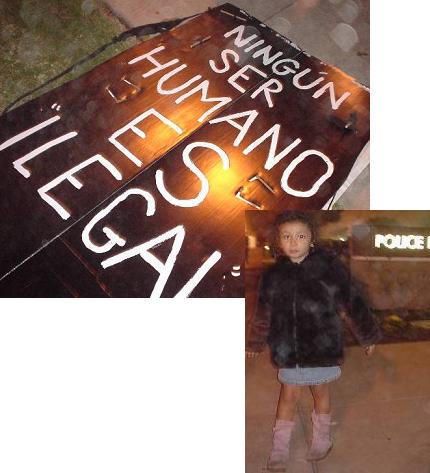
a_child_in_costa_mesa.jpg, image/jpeg, 430x473
Costa Mesans marched and rallied in opposition to the city council's vote to turn the police department into border patrol agents.

a_child_in_costa_mesa.jpg, image/jpeg, 430x473
COSTA MESA, CA, December 23, 2005--Eighty people, calling Costa Mesa's Mayor Mansoor a racist and proclaiming "Ningún ser humano es ilegal," marched through Costa Mesa this afternoon in outrage at the city council's resolution to empower the city police department to check the immigration status of suspects. The city is the first in the country to commit its police to border control, and the demonstrators were determined to reverse that.
The protestors, made up mostly of Mexican-Americans with a handful of white anarchists and activists, gathered at 3:00 p.m. on Sunflower Avenue, in plain sight of holiday shoppers at the South Coast Plaza mall. An hour later, the group marched along Sunflower waving their signs as motorists speeding by honked their horns in support.
I walked for a while with one of the event organizers, a woman from Colectivo Tonantzin. We had met before, after the anti-Minuteman protest in Garden Grove, where several protestors were run down by a Jim Gilchrist supporter and five were ultimately arrested, one for "stealing" a flashlight lying on the ground. She and the others had a red-hot anger at the May Minuteman meeting that had made manifest the racism next door. Now, more than six months later, she and the group were steely-eyed and determined. They were here to do business, to expose the city council for scapegoating immigrants and for officially dividing the people of Costa Mesa along ethnic lines.
Mayor Mansoor's original proposal, which would have targeted people of Meso-American descent for immigration checks for the smallest infraction, even jaywalking, was roundly opposed by the overwhelming majority of the 200-plus residents attending the December 6 city council meeting.
Despite the fierce opposition, Costa Mesa became the first city in the nation to authorize its police department to verify residency status.
The policy the council would train police officers to verify the residence status of any person suspected of a crime with US Immigration. Mansoor claimed the verification training would make the streets of the city safer - but he could not explain how residency checks would accomplish that. The program will cost several hundred thousand dollars and has no provisions to deter false arrest or mass roundups of so-called suspects for immigration checks. The protestors plan to continue pressuring the city council to reverse it new policy of legalized racial profiling.
The marchers turned left onto Fairview Road, into a working class neighborhood earmarked by the Costa Mesa Planning Commission for gentrification. I stopped to make a purchase and fell a block or two behind the group. At the next light, a couple of marchers had waited for me to catch up. We chatted about the long walk, the early darkness, and the small guitar one of them carried. We caught up with the others, and my companions joined the other guitarists who had accompanied us.
Enveloped in the soltice darkness, we reached Fairview and Fall Drive, where the group broke into long chants of "The people united will never be defeated!" and "¡Aquí estamos, y no nos vamos!" As the guitarists picked up the rhythm, the chants turned melodious as we approached the police station. We were met there by more protestors, and together we cheered on speakers as the police videotaped us and print journalists counted the crowd. Only a few of us recognized the four members of Save Our State, an anti-immigrant group which had promised a counterprotest, huddled by their pickup truck in the parking lot.
I looked around to discover we were surrounded by and intertwined with children. Tiny ones in their fathers' arms, toddlers dressed up in fuzzy coats and furry boots, boys and girls doing cartwheels on the grass lawn of the station. I wondered how it would feel to grow up in a nation where the police demanded, "Papers, please."